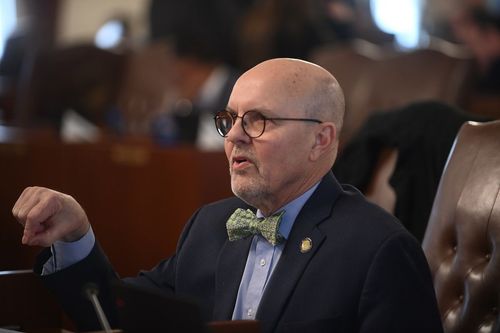Illinois bill aims to establish Midwest’s first clean fuel standard

Illinois State Sen. Dave Koehler, D-Peoria, discusses SB 1556 during a subject matter hearing held by the Illinois Senate Committee on Energy and Public Utilities. / SOURCE: Office of Illinois Sen. Dave Koehler
March 27, 2024
BY Erin Voegele
Legislation introduced in the Illinois Senate earlier this year aims to create a technology-neutral clean fuel standard (CFS) that would reduce the carbon intensity of transportation fuels by 20% by 2038. The Illinois Senate Committee on Energy and Public Utilities addressed the bill during a subject matter hearing on March 22.
Illinois State Sen. Dave Koehler, D-Peoria, introduced the bill on Feb. 8. The legislation, SB 1556, tasks the Illinois Environmental Protection Agency with establishing rules for a CFS to reduce the carbon intensity (CI) from the on-road transportation sector by 20% by 2038. Further reductions could be implemented by the agency based on advances in technology.
Advertisement
Advertisement
Under the CFS, the CI of transportation fuels would be calculated using the U.S. Department of Energy’s GREET model and would include all stages of fuel and feedstock production and distribution, from feedstock generation or extraction through the distribution, delivery and use of the finished fuel by the ultimate customer.
The bill exempts aviation fuels from the CFS but provides that producers of sustainable aviation fuel (SAF) would be eligible to generate credits on an opt-in basis that could be applied to future obligations or traded with other parties.
Similar CFS and low carbon fuel standard (LCFS) programs have been established in California, Oregon, Washington and New Mexico. Efforts are underway to develop CFS and LCFS programs in several other states, including Minnesota and New York.
Advertisement
Advertisement
“It’s time we take action to protect our environment,” Koehler said in a March 22 statement. “This measure would allow Illinois to lead the charge to promote sustainable fuels that create a cleaner future for our state.”
“We owe it to future generations to safeguard our environment today,” he continued. “This is a monumental step forward in our efforts to combat climate change, positioning Illinois as a trailblazer in the global movement toward environmental sustainability.”
According to Koehler’s statement, work on SB 1556 is ongoing as conversations continue, with the aim of creating a program that incorporates feedback from stakeholders and advocates.
Related Stories
California’s new specified source feedstock attestation requirement: A critical new compliance step for renewable fuel producers
As of July 2025, California’s SCFS requires renewable fuel producers using specified source feedstocks to secure attestation letters reaching back to the point of origin. This marks a significant shift in compliance expectations.
The public comment period on the U.S. EPA’s proposed rule to set 2026 and 2027 RFS RVOs and revise RFS regulations closed Aug. 8. Biofuel groups have largely expressed support for the proposal but also outlined several ways to improve the rulemaking.
The U.S. renewable fuels industry on Aug. 8 celebrated the 20th anniversary of the Renewable Fuel Standard. Federal lawmakers also marked the occasion with resolutions introduced in the House and Senate earlier this month.
Iowa farmers have a new market opportunity for their 2025 soybean crop. Landus is expanding its Clean Fuel Regulation initiative, made possible by recent policy changes expected to increase Canada's demand for liquid biofuel.
Klobuchar, Moran introduce bipartisan legislation to support biorefineries, renewable chemicals, and biomanufacturing
Sens. Amy Klobuchar, D-Minn., and Jerry Moran, R-Kan., on July 31 announced the introduction of the Ag BIO Act. The legislation aims to update the USDA’s loan guarantee program to better support biorefining projects.
Upcoming Events










